A Quote by Samuel Johnson
No degree of knowledge attainable by man is able to set him above the want of hourly assistance, or to extinguish the desire of fond endearments and tender officiousness; and, therefore, no one should think it unnecessary to learn those arts by which friendship may be gained.
Related Quotes
There is (gentle reader) nothing (the works of God only set apart) which so much beautifies and adorns the soul and mind of man as does knowledge of the good arts and sciences . Many arts there are which beautify the mind of man; but of all none do more garnish and beautify it than those arts which are called mathematical , unto the knowledge of which no man can attain, without perfect knowledge and instruction of the principles, grounds, and Elements of Geometry.
The word desire suggests that there is something we do not have. If we have everything already, then there can be no desire, for there is nothing left to want. I think that what the Buddha may have been trying to tell us is that we have it all, each of us, all the time; therefore, desire is simply unnecessary.
Friendship is a serious affection; the most sublime of all affections, because it is founded on principle, and cemented by time. The very reverse may be said of love. In a great degree, love and friendship cannot subsist in the same bosom; even when inspired by different objects they weaken or destroy each other, and for the same object can only be felt in succession. The vain fears and fond jealousies, the winds which fan the flame of love, when judiciously or artfully tempered, are both incompatible with the tender confidence and sincere respect of friendship.
The kind of knowledge which is supported only by observations and is not yet proved must be carefully distinguished from the truth; it is gained by induction, as we usually say. Yet we have seen cases in which mere induction led to error. Therefore, we should take great care not to accept as true such properties of the numbers which we have discovered by observation and which are supported by induction alone. Indeed, we should use such a discovery as an opportunity to investigate more exactly the properties discovered and to prove or disprove them; in both cases we may learn something useful.
I think my deepest criticism of the educational system . . . is that it's all based upon a distrust of the student. Don't trust him to follow his own leads; guide him; tell him what to do; tell him what he should think; tell him what he should learn. Consequently at the very age when he should be developing adult characteristics of choice and decision making, when he should be trusted on some of those things, trusted to make mistakes and to learn from those mistakes, he is, instead, regimented and shoved into a curriculum, whether it fits him or not.
We are in fact convinced that if we are ever to have pure knowledge of anything, we must get rid of the body and contemplate things by themselves with the soul by itself. It seems, to judge from the argument, that the wisdom which we desire and upon which we profess to have set our hearts will be attainable only when we are dead and not in our lifetime.
First therefore let us seek the dignity of knowledge in the archetype or first platform, which is in the attributes and acts of God, as far as they are revealed to man and may be observed with sobriety; wherein we may not seek it by the name of Learning; for all Learning is Knowledge acquired, and all Knowledge in God is original: and therefore we must look for it by another name, that of Wisdom or Sapience, as the Scriptures call it.
Friendship is far more delicate than love. Quarrels and fretful complaints are attractive in the last, offensive in the first. And the very things which heap fewel on the fire of ardent passion, choke and extinguish sober and true regard. On the other hand, time, which is sure to destroy that love of which half certainly depends on desire, is as sure to increase a friendship founded on talents, warm with esteem, and ambitious of success for the object of it.
No experiment can be more interesting than that we are now trying, and which we trust will end in establishing the fact, that man may be governed by reason and truth. Our first object should therefore be, to leave open to him all the avenues to truth. The most effectual hitherto found, is the freedom of the press. It is, therefore, the first shut up by those who fear the investigation of their actions.
Nothing is more curious and awkward than the relationship of two people who only know each other with their eyes — who meet and observe each other daily, even hourly and who keep up the impression of disinterest either because of morals or because of a mental abnormality. Between them there is listlessness and pent-up curiosity, the hysteria of an unsatisfied, unnaturally suppressed need for communion and also a kind of tense respect. Because man loves and honors man as long as he is not able to judge him, and desire is a product of lacking knowledge.





































